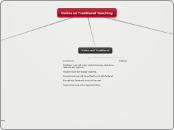af Jared Leiker 12 år siden
478
Online vs Traditional Teaching

af Jared Leiker 12 år siden
478

Mere som dette
Informal Assessment: Cannot use insticts to judge student frustrations. Must rely on instant quizzes, discussion boards, and other means.
Resources and Homework: Student work and resources are always available and never lost.
Support: Peer, teacher, are forums can provide constant support for student learning. Support might not be instant if others aren't available.
Differentiation: Student learning can easily and timely be differentiated per student and not student groups.
Technology Bugs: Requires reliable internet.
Collaboration: Students can collaborate outside the classroom, simutaneously work on documents, and work together without being together.
Lerning Environment: Students can feel safe at home, and have a voice without being talked over. Bullying still must be monitored.
Classroom: Student centered
Informal Assessment: Can get body language clues of student comfort
Paperwork: Easy for students to lose papers and homework
Support: Peer and teacher support and feedback can only be given when present Support is usually instant when in the class.
Differentiation: Uses alot of class time and hard to truly individualize.
Technology Bugs: Learning doesn't require internet access or technology to work.
Collaboration: Can only occur in class together.
Learing Environment: Safe condusive learning environment must be set by the teacher.
Classroom: Can be teacher or student centered